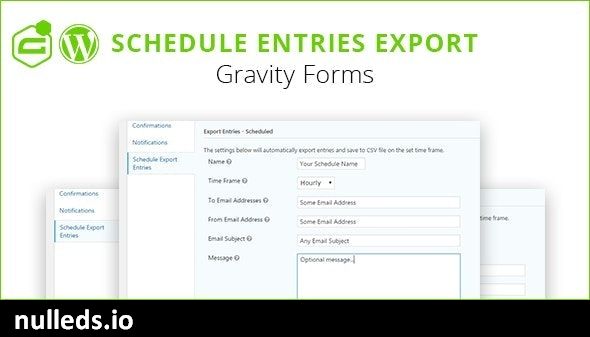Gravity Forms Schedule Entries Export (Free Download)
Gravity Form Schedule Entry Export
This plugin is an add-on to the Gravity Forms plugin. Using the plugin, you can set up scheduled tasks and export any Gravity Form entry to a CSV file.Additionally, files can be sent to a given list of email addresses.
So if you have a form that collects user submissions, the plugin can automatically send the exported entries to your email (on a schedule).
How does it work?
Create a form on your website (using the Gravity Forms plugin) and then just collect the information your customers submit. All user data are saved as entries.
In the screenshot below, you can see the test form and the entry for the form.
The example form has only three records. However, in a real table, you can get a lot of entries per day.Therefore, you may want to schedule an email and automatically receive it with an attachment containing the entry.
To do so, simply go to the Form Settings page and click the Schedule Export Entries tab.
You’ll see the Schedule Export Entry Feed page of the form. Just click the “Add New” button and create a new task to automatically export entries.You can also see the “Current Time” value on this page. It should help you create tasks, as the current time on the website and your local time on your computer may be different.The plugin works with website time.
Please see the screenshot below for an example of the new task settings page.
You can set export to your email. Multiple email addresses can also be set.
It is also possible to allow export files to be saved on your server. Tod does this by simply setting up an export folder. By default, the plugin uses the website root folder. You can change it.After saving the changes, the plugin checks if the folder is writable.
Note that you need to save your tasks. After that you are done and your task will be executed as planned.
New Task Settings Page Fields
As you can see in the previous screenshots, there are different fields to configure your tasks. Let’s discuss one by one:
- Name- Required field, enter some unique name to identify your task.
- Export schedule- Required field, set how often entries are exported and emailed..
- Custom start date- Set a custom start date when the first export should be done (minute, hourly and daily schedules only)
- Export time frame- Required field, sets the time frame for which entries should be selected.
- to email address- Enter a comma-separated list of email addresses to which you want to receive the exported entry file.
- from email address- Enter the email address from which you wish to send the export entry file.
- from email name- Enter the email name from which you want to send the export entry file. You can leave it blank to use the default name.
- Message- Enter a message for the export email.
- form field- Required fields, select the fields to include in the export.
- Condition- Set the conditional logic that must be met before sending the export.
- Enable Email CSV- Send an email when the export is complete.
- Save the CSV on your server- Save the exported data on the server in a file
- directory on the server- Set the directory on the server when saving the export file; this path should be relative to your website’s root directory.
Linux Cron Jobs with WP-Cron
Have you noticed that your scheduled posts in WordPress are missing?Although WordPress has its own cron feature that determines the timing of blog posts and events, WP-cron is not a cron job in the literal sense.
Linux cron jobs can be controlled by the user, ensuring that projects subject to schedules run correctly.Additionally, for high-traffic WordPress sites, Linux cron jobs can help reduce the chance of downtime by reducing bandwidth on the server, thus using fewer server resources.
WP-cron is a virtual cron that only works when the page loads.WP-cron is first loaded by WordPress when a page is requested on the front-end or back-end of the site, at which point WP-cron displays the necessary page to the site visitor.
How to Replace WP-Cron with Linux Cron Jobs
The best way to optimize the efficiency of your WordPress cron job is to disable WP-cron and set up a normal cron job via cPanel that runs every hour.
- Désactivez wp-cron. php
You can disable WP-cron by modifying wp-config. php (located in the folder where WordPress is installed). Open wp-config. php file, add a new line afterdefine('DISABLE_WP_CRON', true); - Désactivez wp-cron. php
- To set up a Linux cron job:
- Log in to your cPanel.
- In the Advanced section, click Cron Jobs.
- Under Add New Cron Job, select the time interval. We recommend that you do not set the interval lower than 15 minutes.
- Set the cron command to the following, replacing your website. com with your actual domain name:
wget -q -O - http://yourwebsite.com/wp-cron.php?doing_wp_cron >/dev/null 2>&1 - Click Add new cron job to set up cron.
In order to test a new cron, just wait for the elapsed time period for the cron to run.If cron is not running, review the steps listed above to make sure you have completed all the steps correctly.
I don’t receive an email when exporting to CSV? why?
If you’re having trouble receiving email, make sure you’ve enabledEnable Email CSVoptions. Also note that an email will be sent if the export contains at least one entry.If you’ve checked all options and haven’t received an email, send a request to your hosting/server provider and ask why the default WordPress email feature isn’t working on your account.They are usually able to resolve your issue very quickly.
How to install WooCommerce Gravity Forms Schedule Subscriptions Export Plugin?
method one:
Method Two:
Thank you very much for viewing this item. If you have any questions about this project, we’d be happy to help. Also rate the plugin if you like it
Change log
Version 1.0.0 - 07 Dec 2016 ### Initial release
Version 1.0.1 - 06 Mar 2017 ### 1) Added new item "Yearly" for the "Time Frame" drop-down selection ### 2) Fixed minor bugs
Version 1.0.2 - 06 July 2017 ### 1) Fixed multisite export bug ### 2) Fixed email headers bug ### 3) Fixed empty email body bug
Version 1.0.3 - 21 Aug 2017 ### 1) Fixed bug in search criteria filter applying on export ### 2) Fixed minor bugs
Version 1.0.8 - 27 Oct 2017 ### 1) Fixed exporting result bug, the result was limited by 20 items, now all exported items are included to the export file ### 2) Added GFSEE_DISABLE_EXPORT constant which allows to disable exporting function in the plugin. ### 3) Added additional information to the plugin feed's settings: Server time and Next Export time. ### 4) Fixed a bug causing wrong exporting result in some cases ### 5) Added new option to the plugin settings "Export Time Frame". Now you can set "Export Time Frame" and "Export Schedule" separately.
Version 1.1.1 - 13 Apr 2018 ### 1) Fixed a conflict with default Gravity Form export feature ### 2) Added a feature to set a folder for the export file ### 3) Added an option to disable email sending when exporting is done
Version 1.2.1 - 17 May 2018 ### 1) Added new feature to set date and time for first exporting (for minute, hourly and daily schedules only) ### 2) Fixed minor bugs
Version 1.2.5 - 21 July 2018 ## Fixed bugs
Version 1.3.2 - 20 Dec 2019 ## Fixed PHP notices bug ## Fixed a bug related with the exported files having the same names ## Fixed parallel exporting bug ## Fixed bug with default GF export file which should be unset once export is finished; ## Added a new "Export" column on the Forms List page. The columns shows the forms having at least one export task;
Version 1.3.5 - 5 Apr 2020 ## Fixed bug with the hourly schedule option, it caused the export done every minute. ## Added more debug information to the log when email errors occur ## Fixed the bug when an email is sent with the empty export file.
Version 1.4.3 - 11 June 2020 ## Fixed the active state bug. A scheduled task continued working even a feed's state was inactive. ## Added a backend notification message when the real server cron is disabled ## Fixed some WPML strings ## Added a hook that fires when the export file name is generated: gfexportentries_get_name_prefix ## Fixed the bug when an email is sent with the empty export file. ## Fixed a rare bug with the next_export_time field. ## Added a new behavior - now the "Directory on your server" field is filled automatically ## Updated the code that adds compatibility with gp_nested_forms ## Adds a new "From Email Name" field. If the value is not set, the default is used instead: "Wordpress <email specified>"
Version 1.4.4 - 15 June 2020 ## Fixed the bug causing receiving of the empty export file
Version 1.4.7 - 04 July 2020 ## Fixed a bug occurring when the export start date is set for such schedules as weekly, monthly, yearly. ## Fixed a bug occurring when the next export date calculation is done wrong if the next export data is set less than the current date. ## Fixed a bug with the export toggle button.
Version 1.5.0 - 01 May 2021 ## Added support for Gravity Forms v2.5 ## Fixed code bugs related to PHP 7.1+ ## Code refactoring ## Simplified date & time scheduling for export tasks ## Replace datetimepicker library with a more maintained version
Version 1.5.1 - 08 May 2021 ## Fixed; wrong calculation of the next export date if monthly or yearly periods are set in Export Schedule
Gravity Forms Schedule Entries Export [Free Download]
Gravity Forms Schedule Entries Export [Nulled]
WordPress » Forms






